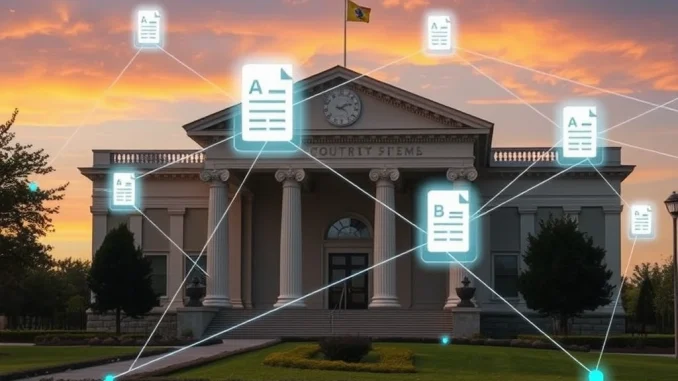
Imagine a world where buying or selling property is faster, more secure, and completely transparent. That future is getting closer, thanks to a groundbreaking move by Bergen County, New Jersey. This densely populated county is taking a significant step into the digital age, specifically leveraging blockchain technology for managing crucial civic records.
What’s Happening with Bergen County Property Deeds?
Bergen County has partnered with Balcony, a firm specializing in land records on the blockchain. The core of this initiative involves migrating a substantial volume of official documents onto a decentralized ledger. Specifically, the plan is to place 370,000 property deeds onto the Avalanche network.
This isn’t just a small pilot. These deeds represent real estate valued at approximately $240 billion. The scale of this project highlights a growing confidence in blockchain solutions for government and public services.
Why Put Real Estate Records on the Blockchain?
The traditional system for managing real estate records involves paper documents and centralized databases, which can be prone to inefficiencies, errors, and potential fraud. Moving these records to a blockchain offers several potential advantages:
- Enhanced Security: Blockchain’s cryptographic nature makes records highly tamper-resistant. Once a deed is recorded on the blockchain, altering it becomes virtually impossible without detection.
- Increased Transparency: While specific personal data can be protected, the history and validity of transactions can be publicly verifiable on the network, reducing disputes.
- Improved Efficiency: Streamlining the recording and verification process can reduce the time and cost associated with property transactions.
- Reduced Fraud Risk: The immutable nature of blockchain records makes it difficult to create fake deeds or hide ownership history.
This move by Bergen County is a strong signal about the potential of this technology to modernize outdated systems.
Why Avalanche for Property Deeds?
Balcony chose the Avalanche blockchain for this project. Avalanche is known for its speed, scalability, and relatively low transaction costs compared to some other networks. These features are crucial for handling a large volume of transactions and data associated with property records.
Avalanche’s architecture allows for high throughput, meaning it can process many transactions quickly, which is essential for a system managing hundreds of thousands of deeds and potentially millions of future updates or transactions.
What Does This Mean for Bergen County and Beyond?
For the residents and businesses of Bergen County, this could eventually lead to a more reliable and efficient process for managing property ownership. While the immediate impact might be behind-the-scenes, it sets the stage for future innovations in how property is transferred and recorded.
More broadly, this project serves as a significant example for other counties and municipalities in the U.S. and globally. It demonstrates a tangible use case for blockchain technology in the public sector, particularly for critical assets like real estate. Success here could pave the way for wider adoption of blockchain for land registries, identity management, and other government functions.
Are There Challenges?
Implementing a system of this magnitude isn’t without its hurdles. Integrating with existing legal frameworks, ensuring data privacy compliance, and educating staff and the public about the new system are all necessary steps. The long-term success will depend on seamless integration and clear processes.
A Step Towards a Digital Future
The decision by Bergen County to place 370,000 property deeds on the Avalanche blockchain marks a forward-thinking approach to public record management. It leverages the security and efficiency benefits of decentralized technology to manage valuable real estate assets. This initiative is a notable example of how blockchain is moving beyond cryptocurrency speculation and into practical applications that can impact everyday life and government operations.
This pioneering effort by Bergen County positions it at the forefront of digital transformation in local government, potentially setting a standard for how property records are managed in the future.



